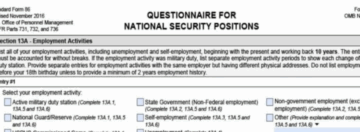A Breakdown of the Tier 3 Background Investigation

So you applied for and were offered a job that requires you to get a Secret security clearance. What does that mean? What checks are run, how far back do they go and who will they contact? Some details are not releasable for public consumption, but the below information is available through various medians and is a general overview.
Here is what the Tier 3 (formerly known as the NACLC) covers for those applying for a security clearance:
- National Agency Check (NAC) – this check is a part of all background investigations and queries OPM’s Suitability/Security Index (SII) and DoD’s Defense Central Index of Investigations (DCII) files for any previous investigations. The NAC also consists of a review of FBI fingerprint/criminal history or involvement in FBI investigations, and any other federal agency checks that may be required depending on the applicant’s position.
- For males, selective service registration is checked. For all, military service records are checked for those who indicate any military service.
- Checks of employment history within scope verifying dates of employment, whether there were any issues, the circumstances of leaving, and eligibility for rehire.
- Checks of residence history within scope for any known issues, payment history, and if you are in or left in good standing.
- Checks of all educational institutes that you attended within scope or the most recent verifying dates of attendance, degrees earned, and any disciplinary actions.
- Checks of local law enforcement agencies for every place you lived, worked, or went to school within scope to see if you were cited, charged, arrested, or convicted for any traffic or criminal offense.
- A credit check is run and reviewed for financial history regarding collections, charge-offs, excessive debt to income ratio, liens, bankruptcies and civil court judgments. Also noted are names, social security numbers, and addresses used for creditors.
- Certain special positions may require additional coverage/questions (e.g., law enforcement positions).
- A triggered enhanced subject interview (TESI) may be necessary when issues or discrepancies from the other checks are present and need further information or clarification.
This is not an all-inclusive list as additional coverage may be required based on the information provided on the SF-86 (e.g., citizenship, overseas coverage, court records), but is close to what the standard checks are for most applicants.



The old ANACI, along with the aforementioned old NACLC, falls within the T3 investigations category (SECRET) as well…with a few different special agency checks unique to each individual applicant and/or agency.
And about how long are these investigations taking? I’m getting different answers ranging anywhere from 16 weeks to a year for the process to be complete - but how long have they been taking to even begin after the SF-86s are submitted?
I’m concerned my job offer will be rescinded due to the long length of time for my investigation to even open. My recruiter assured me I can start as soon as the investigation is opened, but I have no idea how long I should expect to wait, and it seems neither does she. I submitted my SF-86 in early November and my start date has been pushed multiple times.
Your investigation is supposed to be submitted to OPM within 14-21 days after you certify and release it to the submitting agency (DSS). Seems to me it is probably already submitted/opened, but if not then you should contact your FSO to find out why they haven’t submitted it yet.
All Concerned,
I heard from my recruiter and FSO on 12/19/2016
It was stated at their last meeting with DoD that applicants that are submitted for investigation from roughly 12/01/2016 are at an estimated 200 days for a response their investigation. What this means I am not too clear on as it was general intel passed along from my Recuriter, however I would think that in the general statement of this that it means if I submitted on 12/01/2016 that I could be waiting as long as 6 months before my investigation would be even started.
Again this is only speculation and self interpretation of intel that was passed on to me from my Recuriter.
That does not sound correct, interpretation of terms gets lost in translation, Once an EQIP application is initiated by an agency, completed by the applicant, then reviewed for completeness by the agency, it is released to OPM. As long as the EQIP submission is complete and accompanied by the required fingerprints the investigation is scheduled right away. If there is a hold-up in the process it is at the agency level, not OPM.
I have a question. I had a previous position in law enforcement and I was interviewed as a witness in a FBI investigation over 5 and half years. I did not mention on my 86 because I was told it was sealed information. I was later asked during my TS interview about the interview and I disclose as much as I could remember . I believe this may be an issue at adjudication process. Do you know of any good secret clearance attorneys that could help me respond if served a Statement of reasons?
I’m a little surprised… you were just a witness? Why should that be relevant? I just took a look at the SF-86 form (which is like 125 pages long) and I did not see where they even ask.
Other than Section 22 Police Record which pertains to charges against you and Section 28 which asks for involvement in any public record non-criminal civil court proceedings not listed elsewhere, there is not a question that requires this information. An FBI investigation is criminal and not a public record, so in my mind you were not required to disclose it. FBI name checks come back with anyone involved in one of their cases. As long as you were not the one being investigated and had no part in any wrong-doing and you conveyed that during your interview, it should not be an issue that would result in a denial.
I self reported my actions “mistake” to FBI during a proffer. It was voluntary and I was very active during the investigation. I was told I was a witness. I never heard anything after, never was supeoned, arrested , called to court , charged , reprimanded. Just a meeting I had 5 1/2 years ago. I never thought about it. After. The investigator said they were notes of a analyst . Maybe when they ran my name through the FBI . I explained the situation as much as I could remember but this may lead to my security clearance being denied. My background investigator is still doing my investigation. Do you know of a secret clearance attorney? Further more
My position is non sensitive and the employees in my position have a public trust. My supervisor stated that I don’t need a TS for my position, if I can’t get a approved for a TS could I possibly get a down graded clearance.
When I first started I was undergoing a public trust but it was discontinued and TS was requested
If you understood that it was sealed (classified) that is all you should have told the investigator. The investigator should not normally be asking for classified info during an interview.